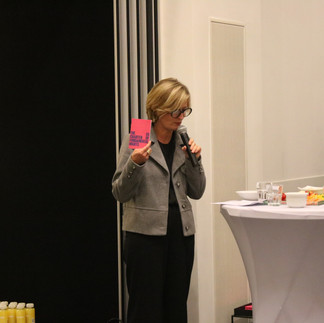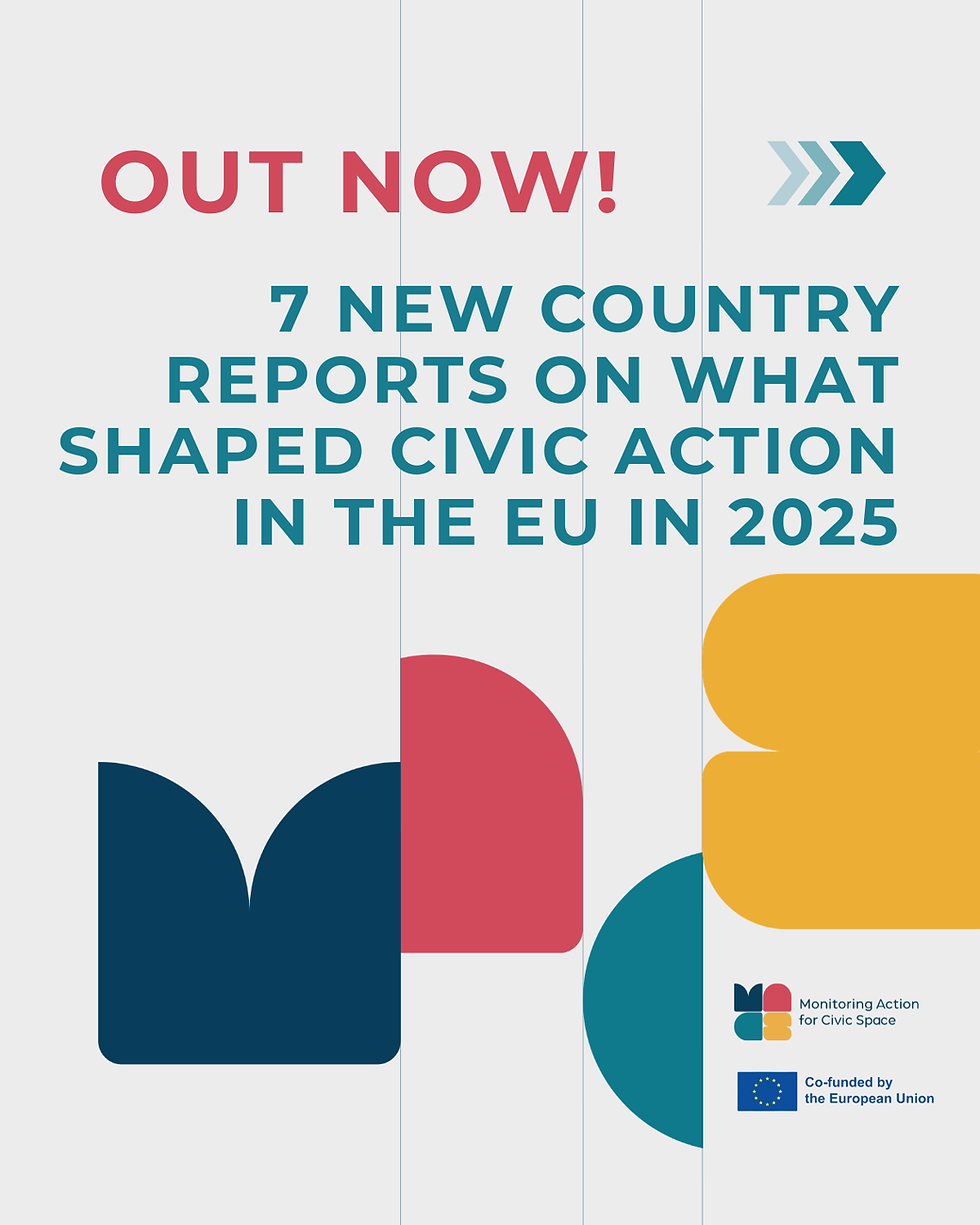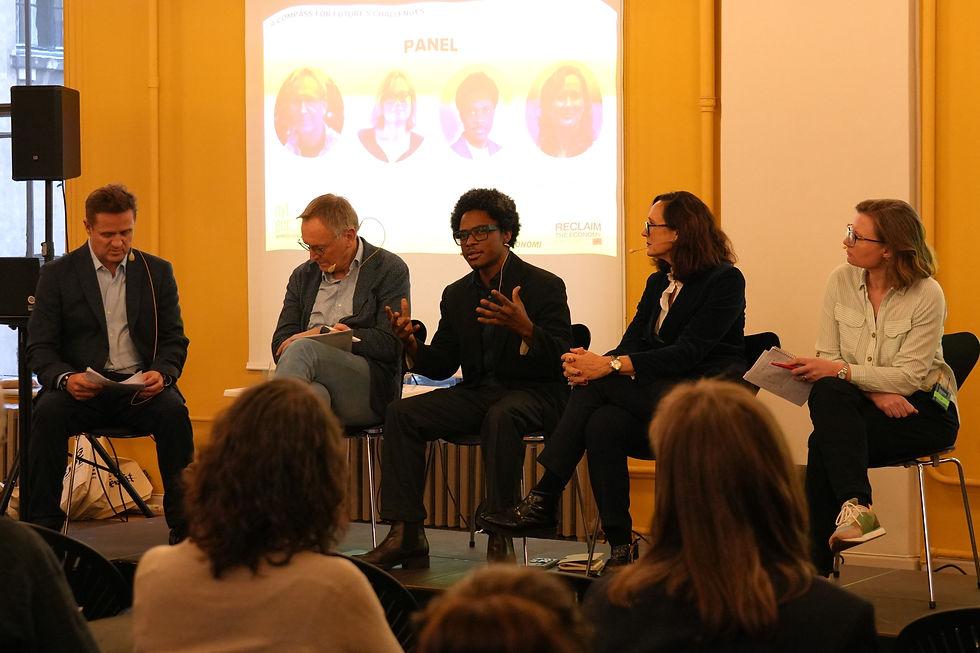Reportage Brussels 2022: Grasping the trends affecting Europe
- 20. dec. 2022
- 7 min læsning
From November 30th to December 2nd, Nyt Europa went on a trip to Brussels, Belgium. Bringing with us the board of directors and young activists, as well as the Art of Fundamental Right exhibition in our suitcase, we were ready to sweep through the streets of the European Capital to get updated on mega trends such as digitalization, the green transition, geopolitical issues, and how we can protect fundamental rights in a digital era.
ChARTer partnermeeting
Starting Wednesday at the office at the European Civic Forum, we finally had our first in-person meeting with our partners to the new art project, “chARTer”,
Representants from the partner organizations that participated were:
Sanne Bruun, Ecomon, Spain
Vladimir Sestovic, European Civic Forum, Belgium
Anne Hardt, Democracy International, Germany
Foteini Retzo, Organization Earth, Greece
Małgorzata Kopka, Institute of Public Affairs, Poland
Similar to the Art of Fundamental Rights project, our new project, chARTer, also interprets fundamental rights through art. Here, new artists and ideas on how to host debates centered around the art, as well as updating the activities for 2023 were discussed.
Opening of the Art of Fundamental Rights exhibition
Thursday 1st of December, we also opened our exhibition in Brussels at the Philanthropy House, which will be a permanent exhibition for the next six months. The exhibition is open to all – so drop by at Philanthropy House, Rue Royale 94 1000 Brussels.
Here, we got speeches from:
Lone Loklindt (Chairperson, Nyt Europa): Lone welcomed our guests, and a brief introduction of the artwork and its connection to the European Charter of Fundamental Rights.
Pia Ahrenkilde Hansen (Director-General for Communication at European Commission). Pia presented an overall statement about the current trends challenging The European Charter, as well as elaborating on the importance of this unique project because: "with the fundamental rights at the heart of the European project, as well as rule of law and democracy, we can of course not expect or should not expect violations". She also adressed how the war in Ukraine is threatening these rights
Maria Stark (Young activist from Hungary): Maria reflected on the situation of the fundamental rights in Hungary, her country of origin. She emphasizes that "we cannot take our rights for granted," which was exemplified by elaborating on the change of adoption laws during the corona virus. These changes includes that only married couple can adopt.
A small summary of what came out in Marias speech:
During the pandemic, there were easier ways in many European countries to overpass legislations to overcome the pandemic, which was also the case in Hungary. Hungary passed on two new legislations, where the first was a constitutional amendment, and the second was the amendment of the adoption law. The constitutional amendment states that the mother in a family is a woman, and the father is a man, "this was a very important issue for our government", Maria said. And the same time, the Hungarian government amendment the adoption law. Before, the LGBTQ+ community had "let's say opportunities" to adopt - there was not mentioned anything about LGBTQ+ in the law, nor did it mention that only married people could adopt either. However, under covid, the government said that adoption by married couples would be the best for the child, meaning that if you are not married you must apply directly to the government. This is difficult because they need signature from specialists that not really exists, hence they need signature from the minister of family policies - who is not really supporting the LGBTQ+ community. This violation of rights is also affecting singles and unmarried couples.
Moreover, Nyt Europa also organized meetings with the European Commission, the European Parliament, the European Environmental Bureau, as well as civil society organizations and the Danish Permanen Representation to the EU. The meetings inluded talks on:
A) The Digital Services Act
Thursday the group met up at the European Parliament to meet with Christel Schaldesmose’s assistant, Mathias Würtzenfeld to speak about the Digital Services Act (DSA). Due to the increase of disinformation, illegal content, especially amplified algorithms, posed by technology, democratic control has been challenged. The DSA aims to address this by supporting protection in the tech-industry, as well as protecting fundamental rights. Schaldemose was the chief-negotiator of the DSA from the European Parliament side. In the European Parliament, Christel Schaldemose sits in the Group for the Progressive Alliance of Social Democrats (S&D) and is a member of the Committee on the Internal Market and Consumer Protection (IMCO), where she is the coordinator for S&D, as well as a member of the Special Committee on Artificial Intelligence in a Digital Age (AIDA). She is also a deputy in the Committee on the Environment, Public Health and Food Safety (ENVI).
The highlights from Mathias’ presentation of the DSA were, but not limited to:
The DSA mainly focuses on illegal content, but it is up to each member states to define what is illegal. Still, the DSA proposes an action mechanism and strengthens notice to authorities.
Not all harmful content is illegal content and vice versa. Hence illegal content is not removed from the platforms. Therefore, the DSA aims at creating regulations that ensures that such content is removed.
Controversial content gets more attention at the platforms, which have resulted in, for example eating disorder and suicide attempts. As such content are more visible and powerful, the DSA puts pressure on platforms to create risk assessment to be able to check if the users exercise the fundamental rights. If the platforms are not doing this, they must mitigate those risks. However, the DSA is not telling them what to do, but that they must do something.
How can the DSA ensure that risk assessment is taking place?
1) Increased transparency: The Commission can access data to see if the actions are working or not. Researchers and NGOs have also, to some extent, access to this data, as well as national digital services coordinator.
2) Increased knowledge and education: The DSA is not regulating but aims at openings the black box of algorithms, meaning, if not controlling them, we need to gain knowledge about the algorithms. There are only a few people in the Silicon Valley that know the algorithms and their consequences. Algorithms are controlling more and more of our everyday life, but we do not control the algorithms, politicians and regulators do not even have this knowledge yet. In the future, we might need to regulate them, but for now, we need to get the knowledge. Knowledge is crucial to become able to create as much transparency in algorithms as possible, which is the Commissions goal in a revison of the DSA and the future Artificial Intelligence Act.
In Brief, the DSA offers, among others:
Distribution of illegal content: The platforms are noticing harm speeches and illegal content but are not doing anything despite they are the one that can control this. The DSA addresses the need to ensure that the platforms are taking action to remove such content. If the illegal content is not removed, the DSA can apply sanctions, hence the DSA are more controlling than GDPR. The member states have also the opportunity to give advice to each other, which can be fruitful when dealing with crisis.
Efforts to protect fundamental rights: If you are a big platform (META, Twitter, Amazon), you must complify with every rule in the DSA. They are not following the normal procedures, because there is no member state that regulate them, meaning the Commission is responsible instead. Therefore, there is a possibility that Twitter, for example, can be banned from the EU. As the DSA cannot define what is illegal content, it is up to the Commission to identify, but this is difficult due to the huge grey zone. The intention of the DSA is that there must be done something. In the risk assessment they must concern fundamental rights which is the essence of DSA.
B) Economic and environmental justice
- with Nick Meynen from European Environmental Bureau
Nick Meynen is Senior Policy Officer for Systemic Change. For 15 years, he has connected grassroots movements working to change the understanding of our economy. Nick has been involved in European projects around ecological economic and environmental justice since 2008 and has investigated environmental front lines around the world, both as a journalist and for civil society.
C) The current political situation
- with Stina Soewarta, Head of Cabinet Margrethe Vestager
Stine is the head of cabinet at Margrethe Vestager in the European Commission and the European Commission's representation in Denmark. We went to the European Commission to have a chat with Stina about the current political situation and of course delve into DSA and tech and rights.
The highlights from the meeting with Stina are, but is not limited to:
The digital transition got a boost after Covid, as the lock-down showed us how much is doable through online platforms such as work, education, doctors’ visits etc.
The green transition got a boost during the Ukraine war. Because Russia has stopped their gas export to the EU, there is very little gas on the market. This gave us a push towards alternatives – greener alternatives.

D) The inclusion of youths
- with med Thomas Desdouits from the European Youth Forum
Friday, we took with us the Youths to meet with Thomas who is Campaigning Officer on Fiscal Policy at the European Youth Forum (EYF). Thomas elaborated on how the EYF work on strengthening youth policies in the EU.
The three main work areas of EYF:
Green, economic transition
Banning unpaid internships (example: the case of Belgium, the EYF sued the nation as 83 percent of internships was unpaid).
Working on 16 as the legal voting age
We also discussed future collaborations, as well as the youths’ perspectives and inputs on the inclusion of youths. Here, the lack of young voices in the decision-making process was addressed.
E) The Danish permanent representation at the EU
Before heading to the airport, we had a chat with ambassador for Denmark’s Permanent Representation at the European Union in Brussels, Per Fabricius Andersen, who is also the former head of the European Policy Office at the Ministry of Foreign Affairs.
Among other things, we discussed EU enlargement, the copenhagen criteria and the commissions Verification and monitoring mechanism, a mechanism created after the accession of Romania and Bulgaria to follow the progress in the fields of judicial reform, corruption and (for Bulgaria) organized crime. All areas where they weren’t completely ready to be incorporated into the European union. The commission also uses this mechanism to assess when the to countries are ready to be a part of Schengen.
Museum of European History
We also visited the House of European History which offers a trans-European perspective. Here we explored how history has shaped a sense of European memory and continues to influence our lives today and in the future. The objective of the exhibitions is to initiate learning on transnational perspectives across the European continent. Interpreting history from a European perspective, the museum connects and compares shared experiences and their diverse interpretations.
Brussels was a blast. It is always good to come back and get updated on the trends affecting the European agenda.






















Kommentarer